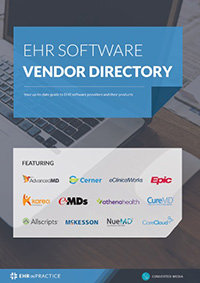Three challenges hospitals face when implementing an EHR
The challenges hospitals face when implementing an EHR differ, to a certain extent, from the problems smaller practices face.
The differences in challenges relate to the scale of implementation being conducted. Hospital EHRs are typically implemented on a larger scale than non-hospital practices. Given the scale of implementation, there are problems that are unique to implementing EHRs on a larger scale in a hospital setting.
The following represent three challenges hospitals commonly face when implementing an EHR.
1. A wider range of stakeholders to please
From an organizational perspective, implementation of an EHR in a hospital setting presents comparatively present more challenges due to the fact hospitals are larger and more organizationally complex structure when compared to smaller practices.
As such hospitals must be able to align the interests of a wide range of stakeholders who may have different expectations regarding how an EHR fits into how they are carrying on their daily work.
Implement your EHR successfully with this customizable EHR implementation template
A comprehensive overview of these particular problems was discussed in a 2015 study, which identified four critical organizational challenges for hospitals implementing EHR:
- Prior existence of appropriate hardware and network infrastructure
- Availability of sufficient funds for investment in the implementation,
- Alignment of the EHR with the organization's goals
- Staff understanding of EHR's features and benefits.
2. Location and size
The location and size of a hospital can present challenges to EHR implementation that must be accounted for in implementation planning.
Put simply, smaller, rural practices often experience comparatively more difficulties in EHR implementation when compared to their larger, more urban peer institutions. Rural hospitals are often at a disadvantage when implementing an EHR given that proper functioning of EHR systems relies on quality broadband connection, which some rural areas due to a lack of demand for these services does not have in place.
In addition to limited communication infrastructure, these hospitals must also contend with trying to fit an EHR into already strained budgets. As reported in a research brief on EHRs in rural critical access hospitals many of these organizations reported significant financial challenges to EHR implementation and use.
The organizations surveyed reported the following challenges: 50% reported EHR implementation costs as the most significant while 35% availability of grants/loans to support EHR adoption and use, and 23% broadband implementation costs as pressing concerns.
3. Poor clinician buy-in
Buy-in among administrative and clinical staff is a challenge al practice face whether they are small or larger organizations. However, the challenge presented from a lack of buy-in to the EHR is made more difficult when it occurs on a larger scale and across a more complicated organization such as a hospital, which may have hundreds or thousands of employees spread across multiple departments.
A 2016 study suggested that obtaining physician cooperation was one of the most significant challenges to EHR implementation. Moving beyond this study one can also point to the importance of overcoming buy-in from administrative and clinical staff as being a significant barrier to overcome.
The challenges facing hospitals implementing an EHR can be significant, and can spin out of control if they strategies to mitigate them are not considered in the implementation process. However, the challenges discussed above are ones that can be managed using adequate planning and enough foresight.
Free white paper

EHR Implementation Template
Get all the planning tools you need to make your EHR implementation a success

Featured white papers
-

EHR Implementation Template
Get all the planning tools you need to make your EHR implementation a success
Download -

EHR implementation: 6 steps to success
Step-by-step information on how to implement EHR effectively
Download -

EHR Vendor Directory
Get the most up-to-date directory of EHR software vendors. Find the best software for your practice.
Download
Related articles
-

EHR Implementation Plan: Your 8-Step Checklist
Your comprehensive checklist for creating an EHR implementation plan.
-

A template for your EHR project implementation timeline
Determining your EHR project timeline will prove tricky, but having some expectations of time fra...
-

5 important areas of EHR training during implementation
Successful EHR implementation is not possible without crucial EHR training

